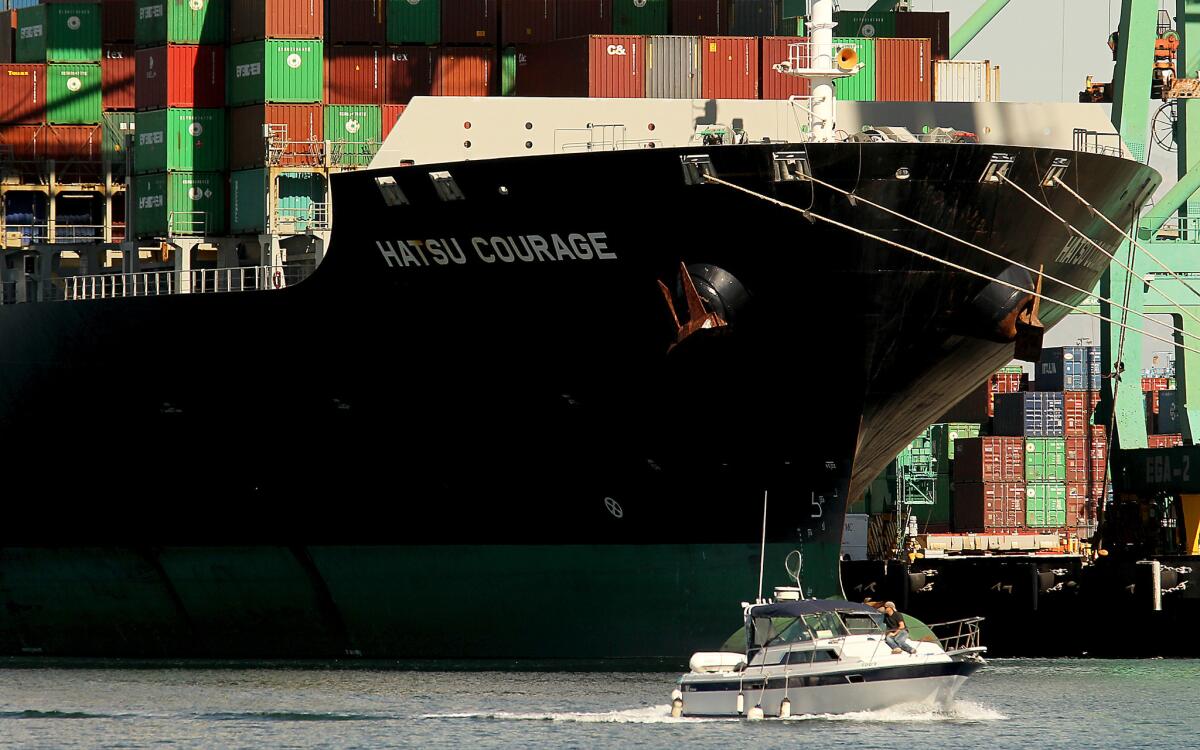At Nature USA, ports stalemate cuts into apparel manufacturing

- Share via
Apparel manufacturer Nature USA usually has enough raw material to keep its factory humming for 10 weeks. But with its next shipments stuck in limbo outside the ports of Los Angeles and Long Beach, the Rancho Dominguez company will run out of yarn in a month.
That spells potential disaster for the business, which knits, dyes and sews apparel for customers across the nation. In the fast-paced fashion industry, any delays can translate into canceled orders or shortened time on store shelves – which could threaten Nature USA’s survival, President Mike Farid said.
“Yarn is our main ingredient,” Farid said. “Temporarily we can move things around and replace things, but if this continues, basically I can’t see anything but a shutdown.”
A months-long labor dispute between employers -- major shipping lines and terminal operators -- and the longshoremen’s union has put a squeeze on ports all along the West Coast. Members of the International Longshore and Warehouse Union have been working since July without a contract while negotiating with the Pacific Maritime Assn. on a new contract for about 20,000 dockworkers at 29 ports on the West Coast.
The stalemate is already hobbling California manufacturers, farmers, retailers and even recyclers, who are waiting to receive goods or export products using ships idling at ports along the coast.
It’s a serious problem especially for those who depend on the Los Angeles and Long Beach ports, which account for about 40% of the country’s incoming container cargo and move about $1 billion in goods a day. Over the long holiday weekend, ship owners put a halt to the unloading of cargo ships in a move that the union contends is a tactic to pressure dockworkers into agreeing on a contract.
Southland companies like Nature USA are scrambling to figure out a Plan B and bracing for losses if the fight continues.
The company gets its raw materials from Asia, which are then turned into fabric and clothing at its Southland factory, Farid said. Already, delivery of yarns that were supposed to arrive in late December from the Los Angeles and Long Beach ports has been extended three times.
Domestic suppliers found in recent months can only provide about half of what the company needs, and those sources are drying up as well, Farid said.
On the East Coast, ports are also slammed with companies desperate for an alternative -- prices have shot up from an average of $2,000 per container to more than $6,000, he said.
“Even if you are willing to pay that, and we are willing to pay, they can’t give us a date because they are booked up,” he said. “We can’t give delivery dates to our customers, our customer can’t give delivery dates to retailers, you are in this utter chaos.”
The negative impact of the port congestion is amplified in the fashion industry, which stocks seasonal apparel that may stay on shelves for only a month or two. A delay of even a week or two cut sharply cut into selling time, Farid said.
“With the delays right now, we are talking about a couple of months delay for production, not one or two weeks,” he said. “It basically means stores very well might not take the product simply because you are looking for spring products right now, and they will arrive in the middle of summer.”
The company is looking at a partial or full shutdown if it doesn’t get new yarn in the next four weeks. “There aren’t any options, there are no contingency plans,” Farid said. “There is nothing we can do.”
Follow Shan Li on Twitter @ByShanLi
More to Read
Inside the business of entertainment
The Wide Shot brings you news, analysis and insights on everything from streaming wars to production — and what it all means for the future.
You may occasionally receive promotional content from the Los Angeles Times.











